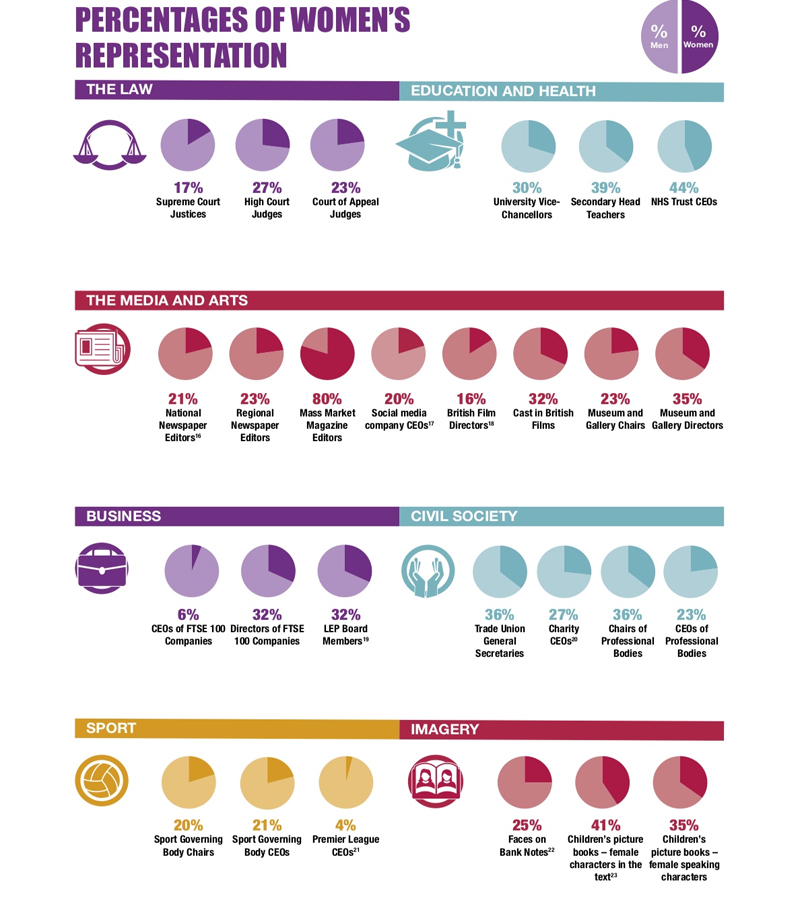The Fawcett Society’s 2020 Sex & Power Index reveals that gender equality is still ‘generations away’ as men continue to dominate every sector of UK public life. The Index, which charts the extent of male domination of positions of power, reveals that women are still missing in significant numbers from top jobs in politics, the law, civil service, trade unions, charities, professional bodies and sport bodies. It also reveals the “alarming lack of women of colour in the top tiers of many sectors”, pointed out Sam Smethers, Chief Executive of The Fawcett Society, the UK’s leading charity campaigning for gender equality.
The data in the 2020 Sex and Power Index highlights the dismally slow pace of change, with stark inequalities continuing to thrive in the UK today. “Despite much lip service about the importance of having women in top jobs, today’s data shows we are still generations away from achieving anything close to equality,” added Smethers.

KEY FINDINGS
In the legal sector, the Supreme Court only has two women justices out of 12 (17%), reveals Fawcett’s study. Since its formation in 2009, there has never been a Supreme Court Judge who is a person of colour. In business, women make up just over one in 20 CEOs of FTSE 100 companies. This remains unchanged since the Fawcett’s last report in 2018. None of these CEOs are women of colour.
In education, women make up just 39% of secondary head teachers. This figure has not changed since 2018 and has risen by just 6% since 2005, according to the study. Women make up 30% of university vice-chancellors, but only 1% of them are women of colour.
The media sector reveals that women make up only 21% of national newspaper editors, with just four women in the top jobs. When it comes to sports, women make up 21% of national sport governing body CEOs, a drop from 26% in 2018. Only 4% of Premier League Clubs are led by women, the study found.

WOMEN IN POLITICS
In politics, only 34% of MPs in House of Commons are women, up only 2% in the recent election. Women of colour now make up 17% of the women MPs, which is in line with the population as a whole. The percentage of women in the House of Lords is at 27%, which is significantly lower than the Commons and up by only 1% since 2018. Only 2% of all peers are women of colour, according to the study,
However, there are no women of colour in the Scottish Parliament, National Assembly for Wales or the Northern Ireland Assembly. Around 30% of the Cabinet are women and 47% of the Shadow Cabinet are female. Approximately one-third of permanent secretaries in the civil service are women (up from 31% in 2018 to 35% currently). Again there are no women of colour in these roles.
This report comes as the Fawcett Society launches the Pay and Progression of Women of Colour Project. Working in partnership with leading race equality think tank The Runnymede Trust, the project will seek to understand the inequalities and intersecting barriers faced by women of colour, and the solutions that will help them to overcome them. “Fawcett’s new project with the Runnymede Trust on the pay and progression of women of colour will shine a spotlight on the specific challenges and barriers they face in the workplace,“ according to Smethers.
FOCUS ON WOMEN OF COLOUR
The two-year project, funded by the Smallwood Trust, will explore the barriers experienced by different groups of women of colour at key transitions in their working lives; the multiple forms of discrimination and disadvantage they experience and a detailed understanding of how they manifest in the workplace.
“It’s astonishing to think that there has been a significant and growing black and ethnic minority population in this country (now one in six people) since the arrival of Empire Windrush in 1948 and yet we have never had a non-White Supreme Court judge, or a Civil Service Permanent Secretary or a CEO of FTSE-100 companies who is a woman of colour,” stated Runnymede Trust’s Deputy Director, Dr Zubaida Haque.

“There have been positive steps and achievements towards gender equality in some key areas of public life, but we cannot assume that generic gender initiatives and targets will also address racial discrimination issues for women of colour. This is why Runnymede Trust is excited to be working with the Fawcett Society on a new project focusing on pay and progression patterns for women of colour,” she added.
ACCELERATING CHANGE
The Fawcett Society is also calling on Government, political parties, the judiciary and employers to act now to ensure a step change in the numbers of women in senior roles. “Male dominance of positions of power remains strong as this 2020 Sex and Power Index shows. If we want change, we have to make it happen. That means quotas, targets and policy interventions to remove the barriers to women’s progression,” added Smethers.
The pace of change must be urgently accelerated to ensure that women in all their diversity are represented, and the Fawcett Society is calling on the Government for the following interventions:
- Gender pay gap reporting: Government should improve gender pay gap reporting by reducing the threshold for reporting to 100+ employees, requiring employers to publish action plans and introducing reporting on the gender pay gap by ethnicity. Employers not currently captured by pay gap regulations could voluntarily make that data available.
- Quotas and targets: Government should introduce time-limited quotas for use across public bodies and the boards of large corporate organisations. The case for quotas remains strong. For other organisations Fawcett recommends the setting of targets and publishing an action plan.
- Flexible working by default: Government should follow up on their commitment in the Queen’s Speech to legislate to make flexible working the default. In addition to this, more roles should be made available on a part-time or job-share basis. Employers can choose now to adopt flexible working as the default for their workplace.
- More data: Government and the Office for National Statistics, should prioritise working with relevant sectors to collect and publish intersectional data to accelerate the pace of change. Government should also commence Section 106 of the Equality Act which would require political parties to collect and publish diversity data for candidates. In the meantime, individual parties could take responsibility for collecting and publishing this data for their own candidates.
Click here for a copy of the report.







































